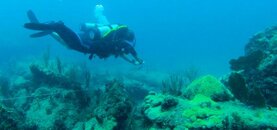daniel f aleman
Contributor
For some time, many here on Scubaboard have wondered why George Irvine would come up with the word Stroke...
I thought that G3 said that Parker used stroke from the mid-80s. No?
Welcome to ScubaBoard, the world's largest scuba diving community. Registration is not required to read the forums, but we encourage you to join. Joining has its benefits and enables you to participate in the discussions.
Benefits of registering include
For some time, many here on Scubaboard have wondered why George Irvine would come up with the word Stroke...
For some time, many here on Scubaboard have wondered why George Irvine would come up with the word Stroke, and who in fact it "Ought: to be used to described.
Wikipedia should have BeanoJones photo next to the word Stroke....she is everything George created the expression to explain.
She is also the first person I have called a stroke in over a decade--and one of about 4 total.
More gas management seems to imply that there is gas management in the OW course. Telling your instructor when you reach 750psi is nothing of the sort.
Apparently in your neck of the woods, the divers taught about Gas Management (one of those fetish things) are running OOA with you... your students OTOH are gliding gracefully through the water like a slippery siren until their inate LOA warning system brings them to the surface.
What very important details did this course miss? Honest question.
As far as the GUE OW course. search does not turn it up easily, but all the discussion is in that thread. One simple one, that is a basic gaffe even a newbie working DM gets, is the instructor was doing briefs with his students facing the sun. (If I remember right this was in Egypt, but frankly I don't remember.) The students were even obviously trying to cover their eyes to see what the instructor was doing. This level of lack of student awareness is breath-taking, and shows someone in love with the sound of their own voice, and apparently unable to even read students reactions DURING a BRIEF! Which bodes not well at all for ability to read things in the water.
And this shows your absolute ignorance of any other environment than your own. Apparently your 20-odd years of tech diving has never seen you in a place like the Red Sea where the sunlight reflects off everything. As this was a 'made for video' presentation of the GUE course, I would suggest that the camera orientation was made so as to put the students in the light. Lighting angles are important in filming.
What I saw in the 'end' were some well trained beginner divers, who were fluid in the skills and aware of their surroundings.
I'm still interested in your opinion on what "important detail that should be absolute minimums in an OW course" were missing?
Yes only in the Red Sea does sunlight reflect off everything. Apparently it even reflects off instructors in the Red Sea so well that an instructor facing the sun is actually brighter than the sun itself. Amazing that.
the instructor was doing briefs with his students facing the sun.
Ignoring details is the actual problem with that GUE OW course. As is saying "important detail" (your words) versus "important details" (what I wrote).
a disorganized time wasting course that missed some very important detail that should be absolute minimums in an OW course.
Those divers took a 10 day course. If that's all 10 days gets that instructor, then that's all that instructor can do. I would be kinda embarrassed with those results with that level of raw material to start with, but then again, this is what I do for a living. That's not what he does for a living.

View attachment 161496
This is being used by NASE.... It should embarrass PADI into doing the right thing--they are a mainstream agency , and as such, they have put a bar up that PADI is no where near.
To be fair, a greater portion of this thread does concern what PADI is doing. They expressed an intent through the 2011 article. That has yet to be reflected in standards. I think that is just a case of speed, not unwillingness. The larger the organization, the more inertia it faces. With such an organization, I'm guessing a fair amount of legal consultation has to happen before intent becomes formal policy and liability prone standards.
